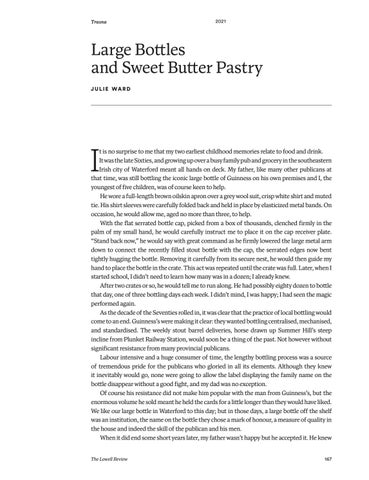Trasna
2021
Large Bottles and Sweet Butter Pastry j u li e wa r d
I
t is no surprise to me that my two earliest childhood memories relate to food and drink. It was the late Sixties, and growing up over a busy family pub and grocery in the southeastern Irish city of Waterford meant all hands on deck. My father, like many other publicans at that time, was still bottling the iconic large bottle of Guinness on his own premises and I, the youngest of five children, was of course keen to help. He wore a full-length brown oilskin apron over a grey wool suit, crisp white shirt and muted tie. His shirt sleeves were carefully folded back and held in place by elasticized metal bands. On occasion, he would allow me, aged no more than three, to help. With the flat serrated bottle cap, picked from a box of thousands, clenched firmly in the palm of my small hand, he would carefully instruct me to place it on the cap receiver plate. “Stand back now,” he would say with great command as he firmly lowered the large metal arm down to connect the recently filled stout bottle with the cap, the serrated edges now bent tightly hugging the bottle. Removing it carefully from its secure nest, he would then guide my hand to place the bottle in the crate. This act was repeated until the crate was full. Later, when I started school, I didn’t need to learn how many was in a dozen; I already knew. After two crates or so, he would tell me to run along. He had possibly eighty dozen to bottle that day, one of three bottling days each week. I didn’t mind, I was happy; I had seen the magic performed again. As the decade of the Seventies rolled in, it was clear that the practice of local bottling would come to an end. Guinness’s were making it clear: they wanted bottling centralised, mechanised, and standardised. The weekly stout barrel deliveries, horse drawn up Summer Hill’s steep incline from Plunket Railway Station, would soon be a thing of the past. Not however without significant resistance from many provincial publicans. Labour intensive and a huge consumer of time, the lengthy bottling process was a source of tremendous pride for the publicans who gloried in all its elements. Although they knew it inevitably would go, none were going to allow the label displaying the family name on the bottle disappear without a good fight, and my dad was no exception. Of course his resistance did not make him popular with the man from Guinness’s, but the enormous volume he sold meant he held the cards for a little longer than they would have liked. We like our large bottle in Waterford to this day; but in those days, a large bottle off the shelf was an institution, the name on the bottle they chose a mark of honour, a measure of quality in the house and indeed the skill of the publican and his men. When it did end some short years later, my father wasn’t happy but he accepted it. He knew
The Lowell Review
167

